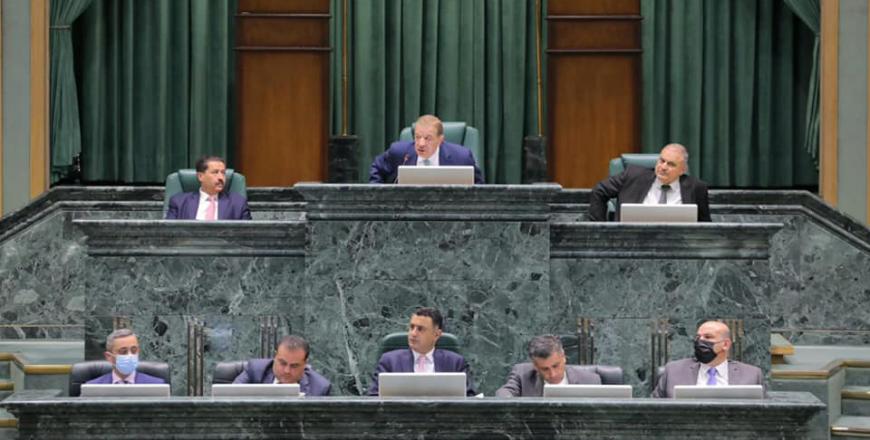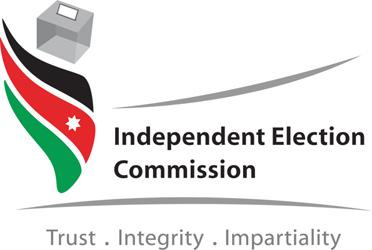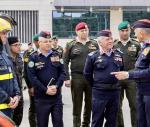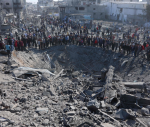You are here
Lower House refers outputs of RCMPS to legal committee
By Rana Husseini - Nov 22,2021 - Last updated at Nov 22,2021

Lower House Speaker Abdulkarim Dughmi presides over a House session on Monday (Petra photo)
AMMAN — The Lower House on Monday referred the outputs of the Royal Committee to Modernise the Political System (RCMPS), with urgency, to the House Legal Committee.
The government recently referred the RCMPS’ recommendations without any amendments and introduced a handful of new clauses to the Constitution, including one to establish a National Security and Foreign Policy Council (NSFPC) to be headed by His Majesty King Abdullah.
A total of 95 deputies spoke in the first reading of the three draft laws, before the House voted with majority to refer the outputs to the legal committee, the Jordan News Agency, Petra, reported.
Prime Minister and Minister of Defence Bisher Al Khasawneh said that the constitutional amendments, which include the formation of the NSFPC, is based on Article 45 of the Constitution that allows to mandate any entity part of the Cabinet’s powers related to the management of the state's internal and external affairs, Petra reported.
The amendments seek to protect the community and sovereign institutions on a constitutional basis from "partisan bickering", the premier said.
The PM noted that the government has adhered to the Royal directives towards referring these drafts — without making any changes — to the Lower House.
The NSFPC will comprise the prime minister, the ministers of Defence, Foreign Affairs and Interior, the Army chief, and the Director of Intelligence, in addition to two members appointed by the King.
Minister of Political and Parliamentary Affairs Musa Maaytah said the new additions to the draft constitutional amendments to establish the NSFPC was meant to ensure the Kingdom’s security and stability.
Maaytah told The Jordan Times that the NSFPC will “be responsible for the national security of the country”.
“The NSFPC will only convene in emergency situations such as, for example, in the event of a local or international threat targeting the Kingdom,” Maaytah said.
One of its essential roles is to coordinate with the various security and political agencies of the state, according to the minister.
“There will not be any interference or influence on the general mandate of the government in the work of the council,” Maaytah stressed.
The King will head the meetings, which will include entities in charge of the security and stability of the country, the minister added.
“Such entities exist in almost all countries of the world,” the minister emphasised.
During a meeting with the RCMPS chairperson and members in October, King Abdullah reiterated that the democratic model Jordanians seek is an embodiment of the political will and national interest.
His Majesty said the political system establishes a new and critical phase in line with efforts to modernise the state in its second centennial, adding that political reform is being implemented in parallel to the government’s economic and administrative reforms, according to a Royal Court statement.
The committee, which His Majesty entrusted Samir Rifai with chairing in June, includes members from across the political and ideological spectrum, delivered a report that includes new draft laws for elections and political parties, and suggested constitutional amendments related to the two laws and parliamentary work.
In addition, the report included recommendations on advancing local administration laws, expanding participation in decision-making, and enhancing an enabling political and legislative environment for further engagement of women and youth in public life.
The King said the recommendations will be pivotal in implementing tangible advancement in platform-based partisan parliamentary work, stressing the need for an action plan for implementation and close follow-up on all levels.
His Majesty called on political parties to develop their tools to win over voters and to meet their aspirations in Parliament, noting that the political, economic, and social empowerment of youth and women is at the forefront of the modernisation process.
Moreover, the King called for developing channels that guarantee the engagement of all segments of society in public affairs, to ensure active and productive political participation, as well as developing accountability measures, read the statement.
His Majesty said the advancement and modernisation process is ongoing and continues to be evaluated to build on strengths and overcome emerging challenges.
Related Articles
AMMAN — The Cabinet on Sunday approved the draft amendments to the Jordanian Constitution for 2021, including the proposed recommendations o
AMMAN — The Independent Election Commission (IEC)’s name is expected to be changed following recent recommendations by a Royal committee to
AMMAN — Senate President Faisal Fayez on Sunday said that the Upper House will deal with the Royal Committee to Modernise Political System’s















